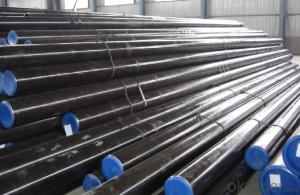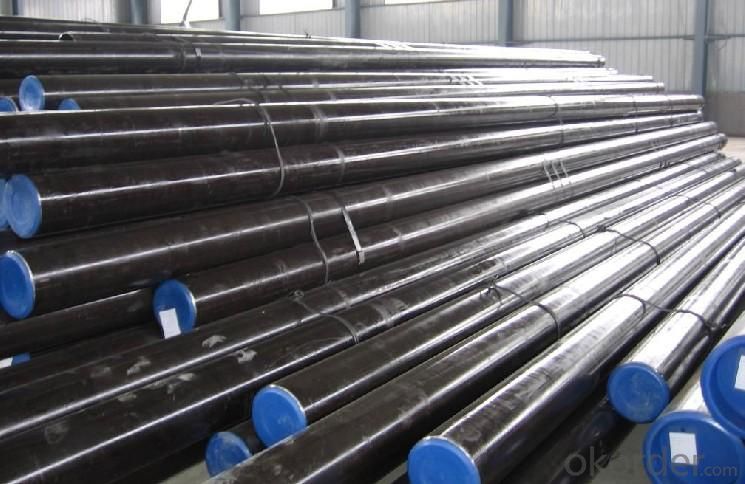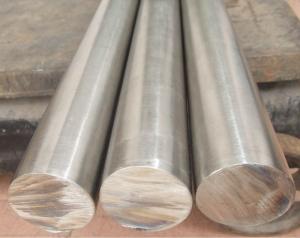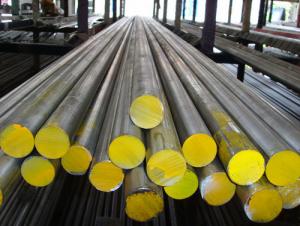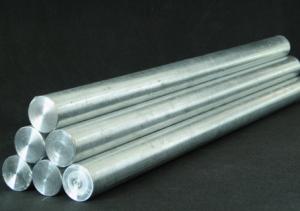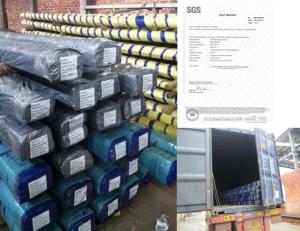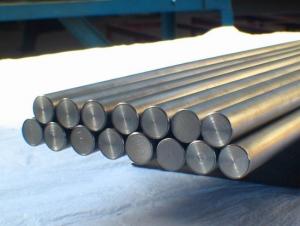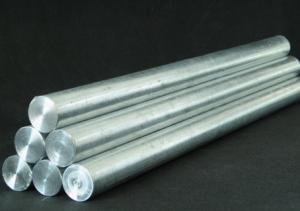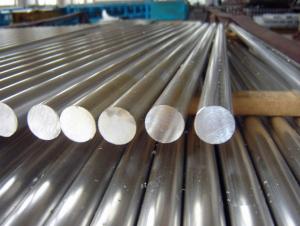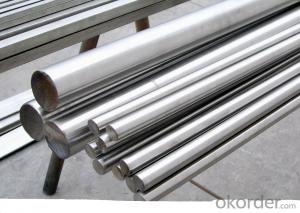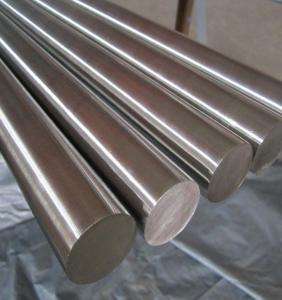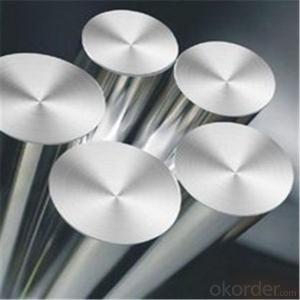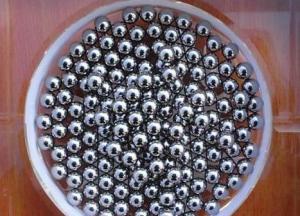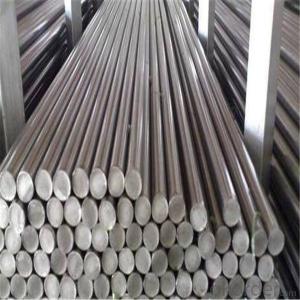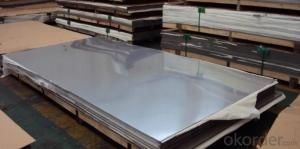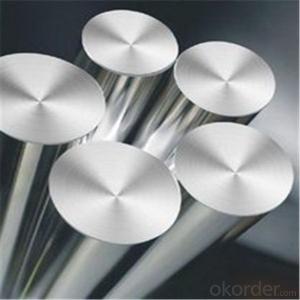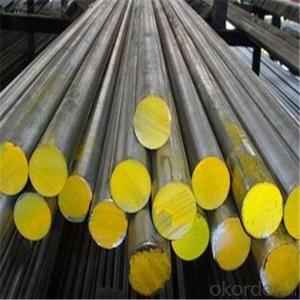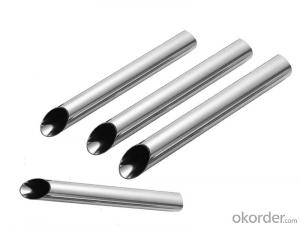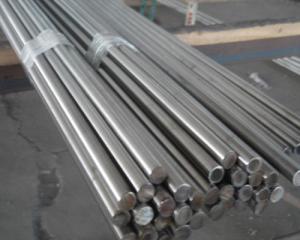Stainless Steel Round Bar-aisi 316
- Loading Port:
- China Main Port
- Payment Terms:
- TT OR LC
- Min Order Qty:
- -
- Supply Capability:
- -
OKorder Service Pledge
OKorder Financial Service
You Might Also Like
Quick Details
| Standard: | Dimensions: | Grade: | |||
| Place of Origin: | Brand Name: | Model Number: | |||
| Type: | Application: | Shape: | |||
| Certification: | Steel Grade: |
Packaging & Delivery
| Packaging Detail: | in bundle |
| Delivery Detail: | depend on the quantity, but the earliest time will be 15days |
Specifications
AISI316 stainless steel round bar
surface finish:bright and polished
Moq:5tons
Delivery time within 15days
Product name | AISI304 stainless steel round bar |
Standard | GB JIS ASTM AISI DIN ect |
Material | AISI 202 202 304 304L 316 316L 321 309S 310S ect |
Diameter | 20mm-3000mm |
Length | 6m length or as customer demand |
Used area | Our products are widely used in the architecture and engineering structure. |
Package | In bundles,or provide the special package as customer demand |
Certification | ISO9001.2000, Mill Test Certificate |
Thirdparty inspection | OMIC,SGS, as customer demand |
Remark | We can customer made for special requirement |
We have been specialized in the steel products for nearly14years old, we are sure to satisfy you with professional knowledge, competitive price,and fast service, if you are interested on us, pls never hesitate to contact with us directly.
- Q: What are the different types of stainless steel bar finishes for aesthetic purposes?
- There are several different types of stainless steel bar finishes that are commonly used for aesthetic purposes. Some of the most popular finishes include brushed, mirror, and satin finishes. The brushed finish creates a textured appearance by brushing the surface of the steel, while the mirror finish creates a highly reflective surface. Satin finishes, on the other hand, provide a smooth and glossy appearance. These different finishes can be chosen based on personal preference and the desired aesthetic outcome.
- Q: Is the heating rod good for glass or stainless steel?
- There are also good glass, stainless steel is also good, a glass abroad, there are nearly 200.Therefore, choose a good brand is the main, some stainless steel cheap, stainless steel is not used. And the stainless steel is mainly to prevent some large fish zhuangpo, some glass, can solve this problem with a plastic jacket is made of stainless steel, and not enough in the water tank.
- Q: Can stainless steel bars be used in power plant equipment?
- Stainless steel bars are indeed applicable for power plant equipment. Due to its high durability and resistance to corrosion, stainless steel is suitable for various industries, including power plants. In power plants, stainless steel bars are utilized for multiple purposes, such as providing structural support, piping, heat exchangers, and turbine components. The exceptional corrosion resistance of stainless steel guarantees the equipment's ability to endure challenging operating conditions, including high temperatures, pressure, and exposure to chemicals or water. Moreover, the strength and oxidation resistance of stainless steel make it a dependable option for power plant equipment, ensuring long-lasting performance under demanding circumstances.
- Q: Are stainless steel bars easy to clean and maintain?
- Yes, stainless steel bars are easy to clean and maintain. Stainless steel is known for its durability and resistance to corrosion, making it an ideal material for bars. Cleaning stainless steel bars is as simple as wiping them down with a damp cloth or using mild soap and water. For tougher stains or buildup, a non-abrasive cleaner can be used. Additionally, stainless steel is also resistant to heat and chemicals, further simplifying the cleaning process. Regular maintenance involves keeping the bars dry and free from moisture to prevent any potential rusting. Overall, the low maintenance requirements and ease of cleaning make stainless steel bars a popular choice for both residential and commercial settings.
- Q: Can stainless steel bars be used in the oil and gas repair industry?
- Stainless steel bars are indeed applicable in the oil and gas repair sector. The reason lies in stainless steel's exceptional resistance to corrosion, rendering it ideal for deployment in environments characterized by elevated humidity, moisture, and exposure to chemicals. In the oil and gas domain, stainless steel bars serve a multitude of purposes, including the repair of pipelines, valves, and other equipment. These bars are renowned for their robustness and longevity, attributes that play a pivotal role in guaranteeing the reliability and endurance of repaired components. Moreover, stainless steel bars are capable of withstanding high temperatures and pressures, thereby making them well-suited for deployment in demanding oil and gas operations. In summary, the extensive utilization of stainless steel bars in the oil and gas repair industry can be attributed to their corrosion resistance, strength, and durability.
- Q: Are stainless steel bars suitable for wastewater treatment plants?
- Yes, stainless steel bars are suitable for wastewater treatment plants. Stainless steel is highly resistant to corrosion and rust, making it a durable and long-lasting material choice for the harsh environment of wastewater treatment plants. Additionally, stainless steel bars can withstand the chemical and physical demands of the wastewater treatment process, making them an ideal option for infrastructure and equipment in these plants.
- Q: Can stainless steel bars be used in chemical storage applications?
- Yes, stainless steel bars can be used in chemical storage applications. Stainless steel is known for its excellent corrosion resistance and durability, making it a popular choice for storing various chemicals. It is resistant to a wide range of chemicals, including acids, alkalis, and solvents, which makes it suitable for storing corrosive substances. Stainless steel bars are also easy to clean and maintain, which is essential in chemical storage applications to prevent contamination. Additionally, stainless steel has high strength and temperature resistance, ensuring the structural integrity of the storage system. Overall, stainless steel bars are a reliable and safe option for chemical storage applications.
- Q: What is the difference between stainless steel bars and stainless steel plates?
- Stainless steel bars and stainless steel plates serve various industries and applications, but they exhibit dissimilarities in shape, thickness, and usage. To begin with, stainless steel bars typically possess a cylindrical or round shape, while stainless steel plates are flat and rectangular. Bars are commonly available in different diameters and lengths, rendering them suitable for applications that necessitate structural support, such as construction, engineering, and manufacturing. Conversely, plates are obtainable in diverse thicknesses, ranging from thin to thick, and are frequently employed in applications that demand a larger surface area or structural integrity, such as building facades, kitchen appliances, and automotive parts. Furthermore, stainless steel bars are primarily utilized for their tensile strength and durability, making them ideal for applications requiring high strength, like construction frameworks, machine components, and shafts. In contrast, stainless steel plates are often chosen for their resistance to corrosion, ease of maintenance, and aesthetic appeal. Plates are frequently employed in industries like food processing, chemical processing, and pharmaceuticals, where resistance to chemicals and cleanliness play a crucial role. Lastly, the fabrication processes for stainless steel bars and plates differ due to their shapes and sizes. Stainless steel bars are typically produced through hot rolling, cold drawing, or machining processes, while stainless steel plates are manufactured via hot rolling, cold rolling, or laser cutting methods. This distinction in fabrication techniques imparts unique properties and characteristics to bars and plates. In conclusion, the key disparities between stainless steel bars and stainless steel plates lie in their shape, thickness, usage, and fabrication process. Bars exhibit a cylindrical or round shape, cater to structural support, and undergo processes that enhance strength. Plates, on the other hand, possess a flat and rectangular shape, serve larger surface areas or structural integrity, and are manufactured to prioritize corrosion resistance and aesthetics. Ultimately, the selection of the appropriate stainless steel product depends on the specific requirements of the given application.
- Q: What are the different types of stainless steel bar surfaces?
- There are several different types of stainless steel bar surfaces, including mill finish, brushed finish, mirror finish, and satin finish.
- Q: Are stainless steel bars heat treatable?
- Yes, stainless steel bars are heat treatable. Heat treatment is a process that involves heating the stainless steel bars to a specific temperature and then cooling them rapidly or slowly, depending on the desired outcome. Heat treatment of stainless steel bars can improve their mechanical properties, such as hardness, strength, and toughness. The heat treatment process can also help to remove internal stresses, improve dimensional stability, and enhance corrosion resistance. However, the specific heat treatment process and parameters may vary depending on the type and grade of stainless steel being used.
Send your message to us
Stainless Steel Round Bar-aisi 316
- Loading Port:
- China Main Port
- Payment Terms:
- TT OR LC
- Min Order Qty:
- -
- Supply Capability:
- -
OKorder Service Pledge
OKorder Financial Service
Similar products
Hot products
Hot Searches
Related keywords
